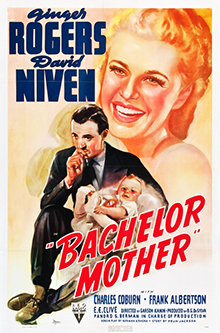
Bachelor Mother (1939) is an American romantic comedy film directed by Garson Kanin, and starring Ginger Rogers, David Niven, and Charles Coburn. The screenplay was written by Norman Krasna from an Academy Award-nominated story by Felix Jackson written for the 1935 Austrian-Hungarian film Little Mother. With a plot full of mistaken identities, Bachelor Mother is a light-hearted treatment of the otherwise serious issues of child abandonment.

Mary Louise Cecilia "Texas" Guinan was an American actress, producer, and entrepreneur. Born in Texas to Irish immigrant parents, Guinan decided at an early age to become an entertainer. After becoming a star on the New York stage, the repercussions of her involvement in a weight loss scam motivated her to switch careers to the film business. Spending several years in California appearing in numerous productions, she eventually formed her own company.

This is a list of notable events in music that took place in the year 1933.
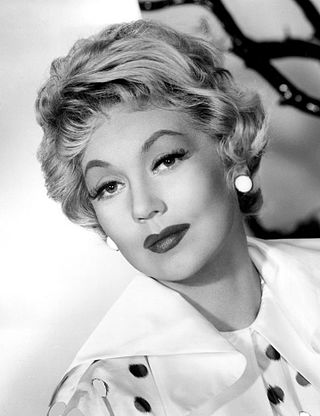
Ann Sothern was an American actress who worked on stage, radio, film, and television, in a career that spanned nearly six decades. Sothern began her career in the late 1920s in bit parts in films. In 1930, she made her Broadway stage debut and soon worked her way up to starring roles. In 1939, MGM cast her as Maisie Ravier, a brash yet lovable Brooklyn showgirl. The character proved to be popular and spawned a successful film series and a network radio series.

The Lucy Show is an American sitcom that aired on CBS from 1962 to 1968. It was Lucille Ball's follow-up to I Love Lucy. A significant change in cast and premise for the fourth season (1965–1966) divides the program into two distinct eras; aside from Ball, only Gale Gordon, who joined the program for its second season, remained. For the first three seasons, Vivian Vance was the co-star.

42nd Street is a 1933 American pre-Code musical film directed by Lloyd Bacon, with songs by Harry Warren (music) and Al Dubin (lyrics). The film's numbers were staged and choreographed by Busby Berkeley. It stars an ensemble cast of Warner Baxter, Bebe Daniels, George Brent, Ruby Keeler, Dick Powell and Ginger Rogers.
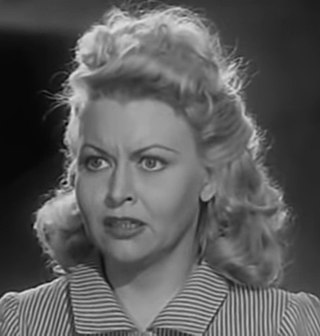
Barbara Pepper was an American stage, television, radio, and film actress. She is best known as the first Doris Ziffel on the sitcom Green Acres.

Donald Cecil Porter was an American stage, film, and television actor.

Charles Powell Walters was an American Hollywood director and choreographer most noted for his work in MGM musicals and comedies from the 1940s to the 1960s.

Critic's Choice is a 1963 American comedy film directed by Don Weis. Based on the 1960 Broadway play of the same name by Ira Levin, the movie stars Bob Hope and Lucille Ball and includes Rip Torn, Marilyn Maxwell, Jim Backus, Marie Windsor and Jerome Cowan in the cast.

Murder at the Vanities is a 1934 American pre-Code musical film with music by Victor Young. It was released by Paramount Pictures and directed by Mitchell Leisen. The film stars Victor McLaglen, Carl Brisson, Jack Oakie, Kitty Carlisle, Gertrude Michael, Toby Wing and Jessie Ralph. Future stars Lucille Ball and Ann Sheridan have small roles as chorines.
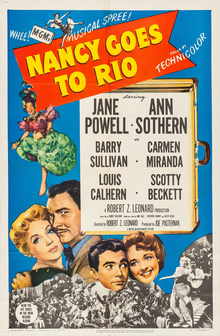
Nancy Goes to Rio is a 1950 American Technicolor musical-comedy film directed by Robert Z. Leonard and produced by Joe Pasternak from a screenplay by Sidney Sheldon, based on a story by Jane Hall, Frederick Kohner, and Ralph Block. The music was directed and supervised by George Stoll and includes compositions by George and Ira Gershwin, Giacomo Puccini, Jack Norworth, and Stoll.
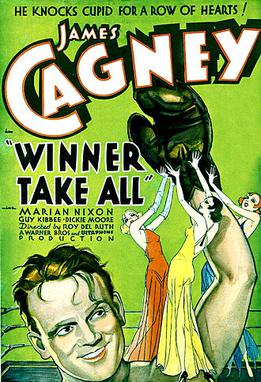
Winner Take All is a 1932 American pre-Code drama film directed by Roy Del Ruth and starring James Cagney as a boxer. The film also features a single scene of George Raft conducting a band that had been lifted from Queen of the Night Clubs, an earlier film and lost film. Cagney and Raft would not make a full-fledged film together until Each Dawn I Die seven years later.

Sally, Irene, and Mary is a 1925 American silent comedy drama film starring Constance Bennett, Sally O'Neil, and Joan Crawford. It is based on the 1922 play of the same name by Eddie Dowling and Cyrus Woods and takes a behind-the-scenes look at the romantic lives of three chorus girls and the way their preferences in men affect their lives. The play was adapted again in 1938, again titled Sally, Irene, and Mary and directed by William A. Seiter. That version stars Alice Faye, Joan Davis, and Marjorie Weaver in the title roles, and co-starred Tony Martin, Fred Allen, and Jimmy Durante.
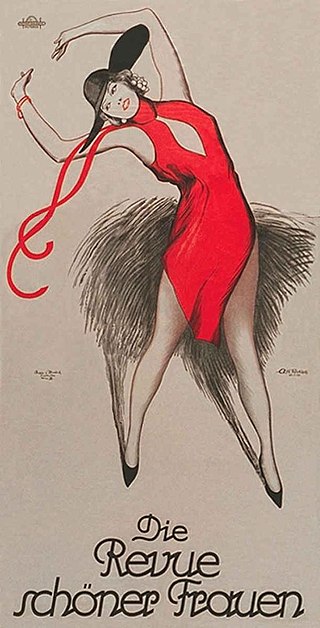
Pretty Ladies is a 1925 American silent comedy drama film starring ZaSu Pitts and released by Metro-Goldwyn-Mayer. The film is a fictional recreation of the famed Ziegfeld Follies. Directed by Monta Bell, the film was written by Alice D. G. Miller and featured intertitles by Joseph Farnham. Pretty Ladies originally featured musical color sequences, some in two-color Technicolor. However, the color sequences are now considered lost.

The Ann Sothern Show is an American sitcom starring Ann Sothern that aired on CBS for three seasons from October 6, 1958, to March 30, 1961. Created by Bob Schiller and Bob Weiskopf, the series was the second starring vehicle for Sothern, who had previously starred in Private Secretary, which also aired on CBS from 1953 to 1957.
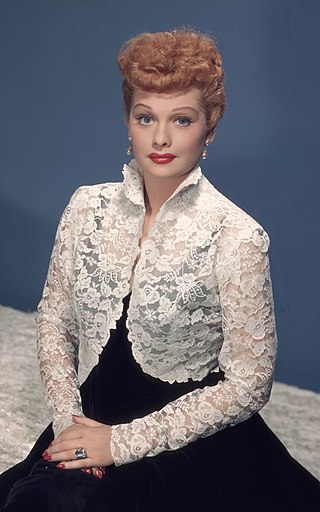
Lucille Désirée Ball was an American actress, comedian, producer, and studio executive. She was recognized by Time in 2020 as one of the most influential women of the 20th century for her work in all four of these areas. She was nominated for 13 Primetime Emmy Awards, winning five, and was the recipient of several other accolades, such as the Golden Globe Cecil B. DeMille Award and two stars on the Hollywood Walk of Fame. She earned many honors, including the Women in Film Crystal Award, an induction into the Television Hall of Fame, a Kennedy Center Honor, and the Governors Award from the Academy of Television Arts & Sciences.

Du Barry Was a Lady is a 1943 American musical comedy film directed by Roy Del Ruth, starring Red Skelton, Lucille Ball, Gene Kelly, and Tommy Dorsey and His Orchestra. It is based on the 1939 stage musical of the same name. Shot in Technicolor, the film was produced and distributed by Metro-Goldwyn-Mayer.
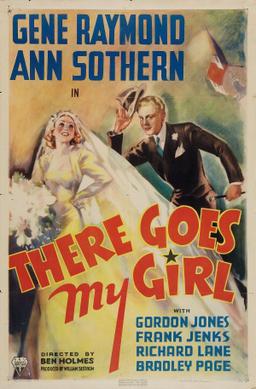
There Goes My Girl is a 1937 American comedy film directed by Ben Holmes, written by Harry Segall, and starring Gene Raymond, Ann Sothern, Gordon Jones, Richard Lane, Frank Jenks and Bradley Page. It was released on May 21, 1937, by RKO Pictures.



















